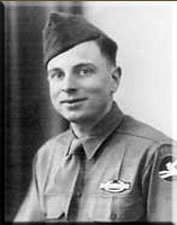
Art Mahler's Story ... told by himself
A Road to Freedom and Liberty
It was Tom Brokaw who coined the phrase for people who were born after World War I, the Greatest Generation. Those who lived at that time considered themselves merely citizens who did their duty to their country. Everyone in that group had their own story that, for the most part, remains a closed book to the generation that followed them. I had the privilege to become an observer as well as being a participant of that group. It was by chance that the United States became my destination. On the way I had to overcome unforeseen obstacles with uncertainty in its future path. Here is my story.
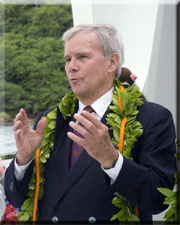 It was Tom Brokaw who coined the phrase:
It was Tom Brokaw who coined the phrase:for people who were born after World War I, the Greatest Generation.
My country of birth was Austria and I grew up in its capital Vienna, a peaceful city intensely proud of its culture and art. That tranquil époque suddenly ended on March 13, 1938 by the invasion of German troops crossing the border into Austria. My father had uncovered and prevented a plot in 1933 where the Nazis tried to overthrow the Austrian government. Now, it became evident, due to my father's previous actions that the lives of our family were at risk. We had to leave to save our lives.
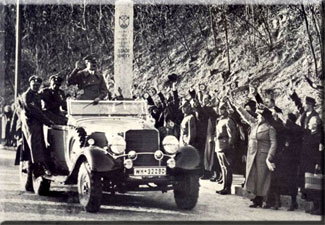 1933 Art's father uncovered and prevented a plot
1933 Art's father uncovered and prevented a plotfive years later Adolf Hitler and his nazis invaded Austria
My father made his summer home on the island of Korcula in the Adriatic Sea, then Yugoslavia, his permanent residence. On August 1, 1938 I left Austria joining my father in Yugoslavia who had become a citizen of that country. The Yugoslav Consulate informed me that since I was not yet eighteen at that time, according to its law, I was automatically a citizen of that country. Within days I was issued a passport.
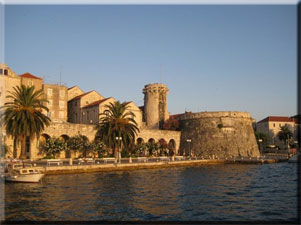 the Island of Korcula
the Island of Korculaoff the coast of Croatia in the Adriatic Sea
Since my parents were separated, my mother applied for an immigration visa for the family, including me, to go to Chile, South America. It was then Christmas of 1938 that the family arrived in Zurich, Switzerland en route to Chile. I was told that my visa to Chile was "sold" at the Chilean Consulate and I had to remain behind. Since I did not speak any of Yugoslavia's languages I attended a technical school in Switzerland. I applied for a visa to Chile as well as to the United States and decided that whichever visa arrived first would be the country to which I would travel to.
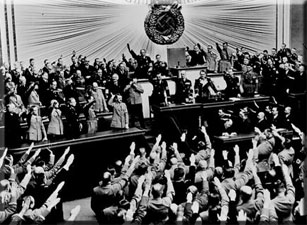 While others were celibrating in 1938
While others were celibrating in 1938Art and his family were trying to get to Chile
My wait for the visa to arrive was subject to a quota system in the United States. In the meantime Nazis had invaded Czechoslovakia and then attacked Poland on September, 1939. World War II had started. France was overrun by May 1940 and the British Army was evacuated back to England at Dunkirk. The German Army started to advance toward Moscow and Stalingrad. Yugoslavia was being invaded by the German Army. My father had to leave his home ahead of the German advance. He left all his possessions behind and arrived with a Visitor's Visa in New York via Salonika, Greece, having traveled through a mine field.
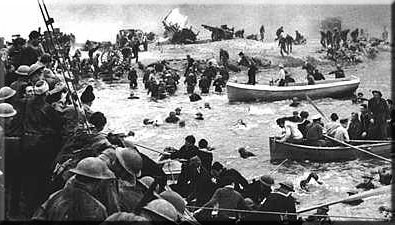 Chaos at Dunkirk, May / June 1940
Chaos at Dunkirk, May / June 1940evacuation of the British Expeditionary Force
It was spring 1941 and Switzerland was fully mobilized militarily against a possible German invasions. Food and clothing were rationed and cities were under black out conditions. My money was being rapidly depleted and there was no news about any visa for me. Finally in early June the U.S. visa arrived. I had to arrange travel through Vichy France that was occupied by Germany. I had to be smuggled through France without German Knowledge, naturally for a price.
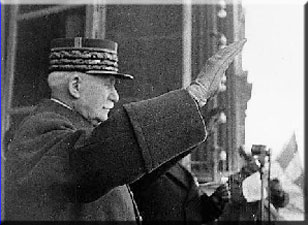 Marshall Petain with the Nazi salute
Marshall Petain with the Nazi salutePetain was a French WWI hero and the leader of Vichy France
he collaborated with the Germans because he had seen
the horrors of war 22 years earlier ...
The ship that was to get me to New York was the "Villa de Madrid" leaving from Barcelona, Spain on June 20, 1941. The ship was designed for coastal excursions between Barcelona and Cadiz and accommodated 100 passengers. For its maiden voyage to the U.S. there were 405 passengers and my passage was fourth class in the hold that had 122 straw filled bunks. The price for that voyage was outrageous.
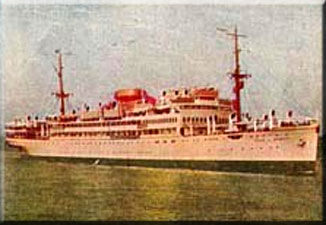 The ship that was to get me to New York was the "Villa de Madrid"
The ship that was to get me to New York was the "Villa de Madrid"leaving from Barcelona, Spain on June 20, 1941
That ship was later called "The Spy Ship" due to the infiltration of Gestapo agents that quietly blended in with all the refugees. We sailed via Gibraltar to Lisbon but were diverted to Las Palmas in the Canary Islands, belonging to Spain. Here we were told that we were at "the final destination" and all passengers would be interned for the duration of the war. Much later we found out that Hitler and Stalin had declared war on each other the day we left Barcelona. Spain did not know if it would join the war with Germany and Italy. In that case it could lose the ship by sailing to New York. After five days on the Canary Islands we did sail for New York, where early in the morning of July 13 out of the fog the Statue of Liberty emerged. Freedom was in sight and was an unforgettable and everlasting memory.
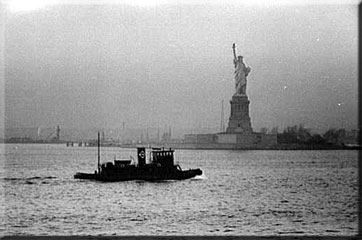 early in the morning of July 13 out of the fog ...
early in the morning of July 13 out of the fog ...the Statue of Liberty emerged ...
I had caught a glimpse of the Statue of Liberty emerging out of the fog as we entered the harbor of New York City. The ship had docked on a pier and the skyline of the city was gigantic. I had to spend another night on the ship while all food and other services were suspended by the port authorities. The ship did not comply with American standards. Some plumbing of wash basins and toilets were not connected when the ship was converted for its maiden voyage across the Atlantic.
 the New York Skyline was gigantic
the New York Skyline was giganticMy father greeted me from the dock but it took another day before I could set foot on American soil due to the lengthy immigration procedure. A week after my arrival I started a job in a machine shop. The beginner's pay was 30 cents an hour. While on the job I had to learn English. Speaking a foreign language in public was not acceptable. My job was in the defense industry and it deferred me from military service. It was a time when all war industry worked long hours. I remember working an eleven hour shift and if need also worked on Sunday's. Everybody was proud to do their share; no questions asked.
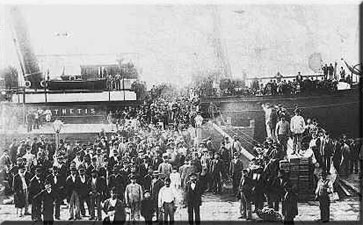 immigrating into the United States ...
immigrating into the United States ...The attack on Pearl Harbor changed everything. There was rationing of meat, sugar, clothing, and shoes. The East Coast had "dim-out", everybody sacrificed willingly. War bonds were bought and we sent "Bundles for Britain". A "slip of the lip might sink a ship" was a phrase that cautioned everyone and ships were watched for. I remember having volunteered as an Air Raid Warden. This was a war effort and everyone was proud of do their share; no questions asked.
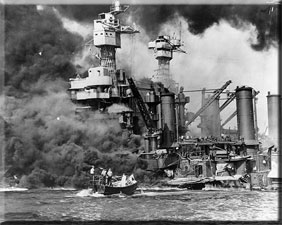 the attack on Pearl Harbor
the attack on Pearl Harbor1944 came around and all of my friends either volunteered or were drafted into the military. I asked myself: what am I doing here when everybody in the war? I gave notice at my job and was reclassified from War Industry Deferred status to 1A.
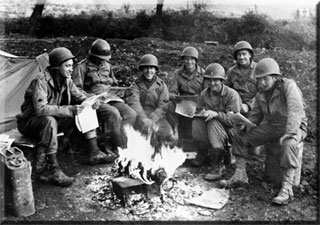 American GI's in the field
American GI's in the fieldMy first day in the Army was May 18, 1944. Seventeen weeks of Basic Training as Rifle Man in the Infantry followed. The Army would not send me overseas unless I was an American citizen so I received, together with all non-citizens, Naturalization papers.
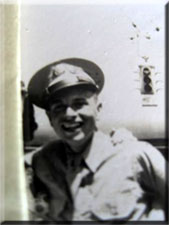 Art Mahler during Basic Training
Art Mahler during Basic TrainingFort Mc Cleland, Alabama 1944
By November 25 I was in a fox hole with the 84th Infantry Division on the Siegfried Line. On December 18th the division moved to the Ardennes and for over a month we were in snow and freezing weather stopping the German attack. We went to cross the Rohr River on February 23, 1945 and took the cities of Muenster and Hanover and created a junction with the Russians at the Elbe River after having liberated a women's concentration camp. After May 8, 1945, VE Day, I spent a year in Military Occupation in Wiesbaden, Germany.
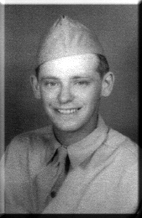
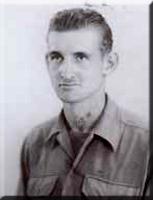
Two of my buddies during the war ...
Left Joseph T Lippi who died of wounds January 8, 1945
on the right Gene Wayne who passed away 63 years later ... January 8, 2008
At the end of May 1946 I became a civilian. My intent was to study engineering and since my father lived in Bethesda Maryland I applied at George Washington University in Washington D.C. All openings were filled and I was put on a waiting list. Nearly seven years had passes since I last saw my mother in Switzerland who now lived in Chile; I decided to make a trip to visit her there. I flew from Miami Florida on a DC 6 to Lima Peru and the next day on a DC 3 to Santiago Chile. It took eleven months when George Washington University accepted me. While in Chile I did some Drafting work for a brother of my grandmother's, who had an electrical engineering business.
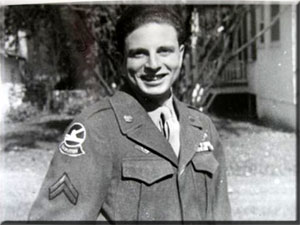 31 May 1946 Art is returning from War
31 May 1946 Art is returning from WarSeptember 1947 I returned to Washington D.C. studied on the GI Bill mechanical engineering and after two years transferred to Montana State University from which I graduated in 1951. The Bremerton Naval Shipyard hired me before I had graduated. I joined a ski club there and met my wife Solveig who had emigrated to the U.S. from Norway. I worked three years in the Ship Yard and in 1954 accepted a structural engineering job with the Boeing Company for thirty-three years. I am fortunate that all three sons of ours live within minutes of my home.
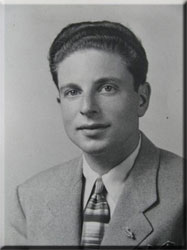 Arth in 1947 as a Student at George Washington University
Arth in 1947 as a Student at George Washington UniversityWashington D.C.
After the war the GI Bill was the reward for all the military participants, and in turn, the Greatest Generation emerged as talented, capable business leader, educators, and entrepreneurs furthering assisting their country.
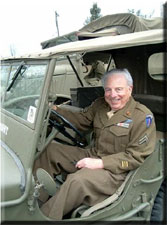 Art after 60 Years in WWII Uniform December 12, 2005
Art after 60 Years in WWII Uniform December 12, 2005at a luncheon of Veterans Battle of the Bulge/Ardennes.
To date nothing can come close to the contribution this amazing group of Americans has made to our country's progress and growth. There can be no doubt that any country is only as strong and free as the educational opportunities it affords the young, brave, and deserving.
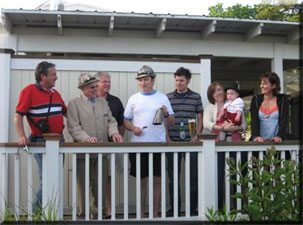 Art in 2005 celibrating his 85th birthday
Art in 2005 celibrating his 85th birthdayFrom left to right: my son Peter, myself, son Eric, son Steve, grandson Dustin
granddaughters Ella and Lucy Solveig and daughter-in-law Stacy ...
Special thanks to Art Mahler, Gene Wayne, Joseph Lippi and to Joseph's wife May and his son Joe Lippi Jr.
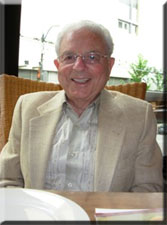 Arthur P Mahler
Arthur P Mahlerpublished Februari 28, 2008